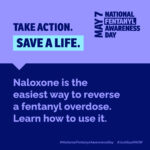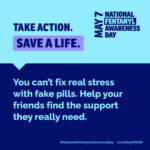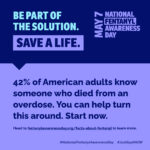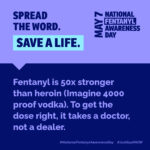May 7, 2024, is National Fentanyl Awareness Day, which aims to raise awareness of the ongoing overdose crisis along with the dangers of fentanyl and its devastating impact on communities across the country. Addressing the ongoing overdose crisis, including raising awareness of the prevalence and danger of fentanyl, remains a priority for Governors.
Fentanyl is a synthetic opioid 50 times stronger than heroin and 100 times stronger than morphine. The introduction of fentanyl into the illicit street supply is commonly referred to as the “third wave” of the United States overdose crisis, and most overdose deaths today are attributed to illicitly manufactured fentanyl. Fentanyl has largely supplanted heroin in the street supply due to being inexpensive to produce.
Fentanyl can be found in other street drugs, including cocaine. An ongoing threat includes an increase in the prevalence of counterfeit pills containing fentanyl. The Drug Enforcement Administration (DEA) has released a public safety alert due to data that shows 7 out of every 10 pills seized by the DEA contains a lethal dose of fentanyl. Given this, those ingesting a substance that looks like a prescription pill but that was not prescribed by a medical professional could be counterfeit and contain fentanyl. Counterfeit pills look like prescription drugs found in pharmacies, are easy to purchase and can be sold in online spaces such as social media sites.
Actions to Prevent Fentanyl-Involved Overdose Deaths
Opioid overdose deaths are preventable, including those involving fentanyl, and there are actions individuals can take to save lives. Fentanyl test strips can be used to detect the presence of fentanyl in a drug supply to support decision-making for people who use drugs.
Individuals can also learn to recognize the signs and symptoms of an opioid overdose and how to use naloxone, a safe and effective medication that can reverse an opioid overdose. For more information on actions to respond to an opioid overdose, please reference the Substance Abuse and Mental Health Services Administration’s (SAMHSA) Overdose Prevention and Response Toolkit.
Awareness Campaigns
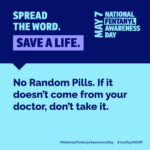
Governmental and non-governmental entities have invested in efforts to raise awareness of the dangers of fentanyl. The CDC’s Stop Overdose Campaign works to address the rapidly growing number of opioid-related overdoses in the United States. Facts on fentanyl highlighted as part of the campaign include:
- Information on illicitly manufactured fentanyl
- The dangers of fentanyl
- The role this synthetic opioid plays in overdoses across the United States
The federal Drug Enforcement Administration (DEA) is also working on ways to reach at-risk populations in the United States. The One Pill Can Kill campaign highlights the prevalence of counterfeit pills seized by the DEA. Additionally, the agency advertises innovative ways to inform those at the most significant risk. Through video game tournaments and partnerships with NFL Alumni Health, they are working to reach teens and young adults to tell them about the dangers of fentanyl-laced drugs.
Non-governmental organizations, including the national non-profit Song for Charlie, seek to inform teens and young adults about the dangers of counterfeit pills. The organization aims to educate and empower its target population to protect themselves and their loved ones by arming them with facts about the risks of the changing drug landscape in the United States.
Raising awareness of fentanyl’s dangers to reduce overdose deaths continues to require a whole government and community response, and Governors are committed to working collaboratively to protect the health and well-being of their constituents. For more information on Fentanyl Awareness Day, please reach out to Alex Entner (AEntner@nga,org).

